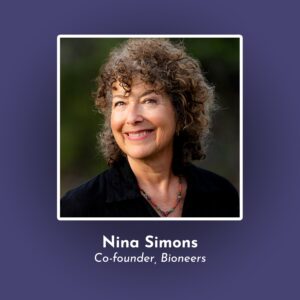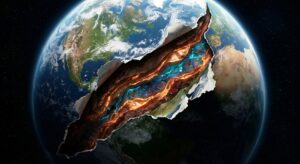
Show Summary
On this episode, author and social entrepreneur Nina Simons reminds us that in a fact driven culture, sometimes it’s important to return to the emotional, physical, and even spiritual in order to balance the conversation. In a world full of 8 billion unique individuals, how can we learn to listen to each person’s unique experience and perspective? Can we integrate the rational with our intuitions, and embody some of the shifts we’d like to see in the world?
About Nina Simons
Nina Simons is the Co-founder and Chief Relationship Officer at Bioneers. She is a social entrepreneur passionate about reinventing leadership, restoring the feminine, and co-creating a healthy and equitable future for all life on Earth. She co-edited Moonrise: The Power of Women Leading from the Heart, and authored Nature, Culture, and the Sacred: A Woman Listens for Leadership—released as a second edition in 2022 with an accompanying discussion guide and embodied practices. The first edition won Nautilus awards in the categories of Women in the 21st Century and Social Change & Social Justice. Nina serves on the Advisory Council for Daughters for Earth, and in 2017, received the Goi Peace Award with her husband and partner Kenny Ausubel.
In French, we have a motto that says that a simple drawing is often better than a long explanation. Jean-Marc Jancovici Carbone 4 President
That’s very understandable because with left atmosphere thinking, one of the problems is that you see everything as a series of problems that must have solutions. Iain McGilchrist Neuroscientist and Philosopher
We can’t have hundreds and hundreds of real relationships that are healthy because that requires time and effort and full attention and awareness of being in real relationship and conversation with the other human. Nate Hagens Director of ISEOF
This is the crux of the whole problem. Individual parts of nature are more valuable than the biocomplexity of nature. Thomas Crowther Founder Restor
Show Notes & Links to Learn More
Download transcript00:40 – Nina Simons info, works, Bioneers
05:40 – Kenny Ausubel
05:50 – James Hansen
06:00 – Seeds of Change
07:21 – Bioneers podcast and web series
08:52 – Buckminster Fuller, The Preferred State
09:52 – Full Spectrum Leadership
15:25 – The Burning Times
16:00 – European Era of Witch Burnings
16:48 – Masculine and Feminine
17:48 – Transfer of medicine and healing from primarily women to men
18:48 – Epigenetics
22:01 – The Athena Doctrine
22:26 – Daughters for Earth
24:25 – Women are generally more involved in raising children than men
24:57 – Cycle syncing/syncing to the moon
25:23 – Fritjof Capra
27:35 – Iroquois questioning absence of women decision-makers/slavery in colonial governing
28:20 – Women of the Longhouse
28:50 – Patriarchal links to material surplus
31:40 – Different cultures and cooperation
34:28 – Resilience in nature study finding higher biodiversity results in faster and better recovery
35:01 – Janine Benyus – biomimicry
36:24 – Beloved community
36:55 – Introverts/extroverts – societal bias
40:00 – Dawna Markova, different learning types
45:25 – Earth Day 2022
47:05 – Native language and culture reclamation
47:49 – The Mycelium is Listening
48:03 – Fantastic Fungi
49:19 – Jonathan Haidt + TGS Podcast
49:28 – The Righteous Mind
53:48 – Transpersonal
59:34 – Epigenetic Trauma
1:00:34 – Fossil industries funding climate denialism education
1:04:19 – Corporation influence on the U.S. government and other governments
1:05:31 – Consensus Trance
1:06:49 – Anti-violence movement, Gandhi
1:10:41 – Discomfort Resilience






